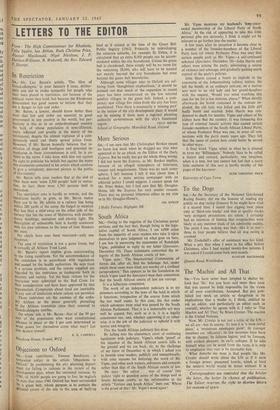South Africa .
SIR,—Owing to the vagaries of the Christmas postal services, and the fact that, though living in the legis- lative capital of South Africa, I am 6,000 miles from the majority of your readers who take it upon themselves to pass judgment on what goes on here, I am late in answering the statements of Randolph Vigne. published in reply to my letter (Spectator, December 18). These statements concerned the in- tegrity of the South African courts of law. Vigne says: 'The International Commission of Jurists did, after all, find the Sabotage Act, under which these cases were tried, not worthy of a civilised jurisprudence.' This appears to be the foundation on which Vigne (and the Spectator) base their contention that the South African courts of law are corrupt. It is a fallacious contention.
The work of an independent judiciary is to try prisoners according to the laws of the land in which it functions, irrespective of the source from which the law itself stems. In this case, the Act under which saboteurs were tried was passed by the South African Parliament. That it is a lamentable act may well be argued, but, such as it is, it is a legally constituted one, and, whether approving it or other- wise, it is the job of the judiciary to uphold it with justice and integrity.
This the South African judiciary has done.
By falling into the elementary error of confusing legislature with judiciary. Vigne's whole 'proof' of the injustice of the South African courts falls to the ground and we are back, sir, to the challenge of my letter of December 4, in which 1 asked you to furnish your readers, publicly and unequivocally, with your reasons for believing the word of Mr. Vigne, and other such traitors, saboteurs and cowards, rather than that of the South African courts of law.
He says: 'the editor . . . was of course' (my italics) 'right to question some of the things said in South African courts, as the information in the
article "Torture and South Africa" bore out.' Where is the proof of this? Mr. Vignc's word again? Mr. Vigne mentions my husband's 'long-since- ended membership of the Liberal Party of South Africa.' At the risk of appearing to take this little personal gibe too seriously, I think it might yet be relevant to go further into the matter.
A few years after its inception it became clear to a number of the founder-members of the Liberal Party here (of whom Professor Price was one) that certain people such as Mr. Vigne—a self-confessed saboteur (Spectator, December 18)—John Harris and others were joining the party, advocating a course of violence and sabotage, and gradually gaining much control of the party's policies.
John Harris caused a bomb to explode in the concourse of the Johannesburg railway station. He left the bomb, in an ordinary suitcase, on a station scat next to an old lady and her grand-daughter with the request, 'Would you mind watching this case for me for a few minutes, please?' When shortly afterwards the bomb contained in the suitcase ex- ploded, the old • lady was killed and the little girl badly burnt and scarred. John Harris was con- demned to death for murder, Vigne and others of his kidney have fled the country. It was foreseeing this type of criminal lunatic activity that caused certain founder-members of the South African Liberal Party, of whom Professor Price was one, to sever all con- nections with the party many years ago. They felt that the cause of justice here could better be served in other ways. -
A final word. Vigne refers to what he is pleased to term my 'Billingsgate.' Nobody likes to be called a tiaitor and coward, particularly, one imagines, when it is true, but one cannot but feel that a nasty little outburst of this sort is hardly worthy of the pages of the Spectator.
University of Cape Town
RUTH CHRISTINE PRICE






































 Previous page
Previous page